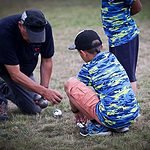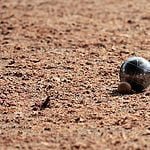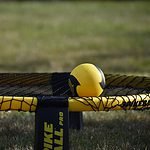You've just entered the vast universe of Frisbee sports, where understanding fouls is as important as throwing the disc itself. As you explore games like Ultimate and Disc Golf, you'll find that different fouls can significantly alter the game's outcome and player dynamics. You'll need to grasp concepts like strip fouls, which occur when the disc is knocked out of a player's hands illegally, and blocking fouls, where a player impedes the movement of another. But how do you effectively identify and address these violations to keep the game fair and spirited? Let's explore the intricacies of these rules and their impact on the game's integrity and excitement.
Types of Ultimate Fouls

In ultimate Frisbee, several common fouls can impact the flow and fairness of the game. A receiving foul occurs when there's non-minor contact between players before or after a disc play. This type of contact disrupts the receiver's ability to make a fair play, potentially altering the outcome of the game.
Another prevalent issue is the strip foul. You'll recognize this when a player makes contact that causes another player to drop the disc. This is particularly contentious as it directly affects possession and can greatly shift the game's momentum.
Blocking fouls are also important to understand. They happen when a player initiates unavoidable contact with an opponent, obstructing their movement or play in a way that's not permitted by the rules. This type of foul often occurs during competitive play, where physical boundaries are sometimes tested.
Force-out fouls are noted when a receiver is fouled before they've established possession of the disc. It's essential to monitor this to maintain a fair competitive environment.
Lastly, dangerous play is any action showing reckless disregard for player safety. This includes excessively aggressive maneuvers that risk the well-being of players. Recognizing and avoiding such behavior is essential for maintaining sportsmanship and safety in ultimate Frisbee.
Recognizing Common Violations
You must be vigilant in identifying contact fouls, which often disrupt the flow of the game and can lead to penalties.
Understanding space violations is equally essential, as maintaining proper positioning prevents unnecessary physical contact and promotes fair play.
Recognizing these common violations will enhance your knowledge and appreciation of the strategic elements in Frisbee sports.
Identifying Contact Fouls
Recognizing contact fouls is essential for maintaining fair play and safety in frisbee sports. These infractions typically involve physical contact between opposing players, often disrupting the spirit of the game and impacting a player's performance.
- Receiving Fouls: Imagine a player leaps to catch the disc, but an opponent crashes into them, hindering their catch. This non-minor contact before or after the disc play is a classic example of a receiving foul.
- Strip Fouls: Visualize a player securely holding the disc, ready to throw, when suddenly an opponent knocks it out, causing a drop. Such actions result in strip fouls.
- Blocking Fouls: Picture a player dashing recklessly, colliding with a stationary opponent. This unavoidable contact initiated by aggressive movement defines a blocking foul.
Understanding Space Violations
While contact fouls disrupt individual players, space violations like picks and screens impede the overall flow of movement on the field. Picks occur when you block an opponent from following their mark, disrupting play without physical contact.
Similarly, screens involve setting up an obstruction, either by standing or moving in a way that prevents an opponent from moving freely. You must also watch out for double-teaming, which is when a defender guards you without actively marking the disc.
To prevent these violations, maintain a reasonable distance from the player you're guarding. Recognizing and avoiding space violations is essential to guarantee fair play and adherence to the rules of Ultimate Frisbee.
Handling Picks and Screens

In your play, it's important to distinguish between illegal picks and legal screening techniques. If you incorrectly set a pick or screen, you risk penalties that can shift the game's momentum against your team.
Understanding these rules guarantees fair play and minimizes the chances of a turnover due to fouls.
Identifying Illegal Picks
To identify illegal picks in Ultimate Frisbee, you must observe whether the screen set by an offensive player unfairly impedes a defender's movement by being too close or by moving. Recognizing these fouls is vital to maintaining fair play.
Visualize these scenarios to spot illegal picks:
- An offensive player suddenly shifts position as the defender approaches, causing unavoidable contact.
- A screen is set so tightly that the defender can't maneuver around without changing pace or path drastically.
- The offensive player doesn't maintain a stationary position, continuously edging closer to the defender, restricting their ability to play effectively.
Legal Screen Techniques
You can enhance your team's offensive dynamics by mastering legal screen techniques in Ultimate Frisbee, which involve setting stationary picks within three feet of the player with the disc. When executing screens, you must make sure that you remain stationary. This precision prevents moving picks, which are fouls and detract from fair play. Players setting screens contribute immensely to creating open spaces and strategic advantages for teammates.
Defensive players have the challenge to navigate these screens without initiating contact, maintaining the integrity of the game. By understanding and applying these legal screen techniques, you uphold fair play and optimize your team's offensive strategies. Mastering this aspect of the game is essential for both seasoned players and newcomers.
Consequences of Fouls
Understanding the consequences of fouls involving picks and screens is vital for maintaining fairness and competitive integrity in Ultimate Frisbee. When a foul occurs due to illegal picks or screens, the game's flow is disrupted, underscoring the significance of fair competition. If you're involved in setting or encountering these, it's important to know the implications:
- Immediate Stoppage: Play halts, allowing players to address the situation.
- Turnover Possibility: If the foul is contested successfully, possession may shift to the opposing team.
- Position Reset: Players return to their respective positions prior to the foul, ensuring no advantage is gained.
Grasping these consequences helps preserve the spirit and fairness of the game, keeping each match competitive and enjoyable.
Defining Dangerous Play

Dangerous play in Ultimate Frisbee encompasses actions that exhibit reckless disregard for the safety of players. It's important that you grasp what constitutes dangerous play to guarantee not only your safety but also that of your fellow players. This category of fouls includes, but isn't limited to, significant collisions, wild throwing motions, or any action that could likely result in injury.
The essence of identifying dangerous play lies in your ability to recognize movements that compromise player safety. Actions such as charging into an opponent, making overly aggressive physical contact, or executing plays that ignore the proximity of other players can all be flagged as dangerous. It's not just about the consequences, but the potential risk these actions pose.
You must have reasonable grounds to call out dangerous play. This isn't just about what happens after an incident; it's also about prevention. By calling attention to a dangerous situation before it escalates, you help maintain a safe playing environment. Remember, the focus is on preventing collisions and ensuring fair gameplay. Always stay alert and prioritize safety over competitiveness to keep the spirit of the game alive.
Rules on Double-Teaming
Why is it illegal to double-team a player in Ultimate Frisbee?
The primary reason is that it maintains the balance and fairness inherent in the sport. When you're playing, if two defenders guard you simultaneously, it creates an unfair advantage for the defense and undermines the spirit of the game. This rule guarantees that each player holding possession of the frisbee can make strategic plays without overwhelming pressure.
In practical terms, here's what you need to watch out for to avoid double-teaming penalties:
- Always keep count of defensive players: Make sure there's only one marker within three meters of the player with the frisbee.
- Communicate with teammates: Coordination is key to avoid unintentionally converging on the same opponent.
- Heed the call: If an opponent calls out a double-team, quickly adjust your position to rectify the situation.
Disc Space Violations

In Ultimate Frisbee, understanding disc space is essential for fair play. You must maintain a minimum of one disc diameter between you and the disc holder to prevent space violations.
If you're too close, it can lead to a turnover or a foul call, disrupting the flow of the game.
Defining Disc Space
Understanding disc space is essential, as violations occur when a defender stands too close to the disc thrower, infringing on the required arm's length distance. To uphold the spirit of fair play in Ultimate Frisbee, it's vital you recognize and avoid these common mistakes that lead to disc space violations. Here are key visuals to remember:
- Imagine a bubble around the thrower, roughly the size of an extended arm with a disc, ensuring the defender doesn't pop this bubble.
- Visualize the thrower pivoting comfortably, without their movements being restricted by a too-close defender.
- Think of the disc's diameter as a ruler for maintaining the minimal legal distance from the thrower.
Adhering to these guidelines helps prevent penalties and maintains the game's flow.
Common Violation Examples
Disc space violations commonly occur when defenders don't maintain a reasonable distance from the thrower, thereby impeding their ability to pivot and execute a throw effectively. As a player, you must make sure that the marker, or defender, allows you sufficient room to maneuver. This means keeping a distance that doesn't restrict your throwing motion in any way.
Disc space violations can lead to a turnover or a foul call, greatly impacting possession and the game's flow. By enforcing disc space rules, fair play is maintained, and proper defensive positioning is encouraged.
Always remember, allowing the thrower enough space to pivot and throw the disc freely is essential in Ultimate Frisbee.
Resolving Space Conflicts
To effectively resolve disc space violations, you must clearly communicate with the marker to establish and maintain the necessary distance for unimpeded play. When the marker infringes on your space as the player with the disc, it disrupts your ability to execute throws effectively, potentially leading to turnovers.
- Visualize a buffer zone: Imagine an invisible circle around you, providing ample space to pivot and throw.
- Step back and signal: If crowded, step back and use hand signals to indicate the need for space, ensuring clear, non-verbal communication.
- Call the violation: If space isn't given, confidently call the violation to halt the play, allowing for a reset and acknowledgment of the rules.
Contact and Physicality

In Frisbee sports, you should avoid physical contact to maintain the integrity of the game's non-contact nature. While the sport is dynamic and fast-paced, it's important to remember that contact can lead to fouls and disrupt the spirit of the game. Dangerous play, which includes significant collisions or reckless actions, is strictly considered a foul. This rule guarantees that all players remain safe and that the game is played fairly.
You must have reasonable grounds to call dangerous play, which helps prevent potential injuries on the field. It's not just about avoiding contact; it's about playing responsibly and respecting the safety of your opponents and teammates. Receiving fouls occur if there's non-minor contact before or after a play on the disc. This type of foul highlights the importance of timing and spatial awareness in avoiding unnecessary clashes.
Blocking fouls occur when you cause unavoidable contact during gameplay. This happens if you impede the movement of another player without a legitimate attempt to play the disc, emphasizing the need for careful positioning and movement strategies. Always aim to play with awareness and control to minimize these incidents and uphold the game's integrity.
Penalties for Misconduct
When managing misconduct in Ultimate Frisbee, penalties such as warnings, ejections, and game suspensions are enforced to uphold the sport's integrity and maintain a respectful playing environment. You'll find that the rules are in place to guarantee fair play and foster the spirit of sportsmanship among all participants.
Penalties arise for various breaches, including:
- Unsportsmanlike conduct: This can range from verbal abuse to physically aggressive behavior.
- Fighting and rough play: Actions that threaten the safety of players call for immediate intervention.
- Abusive language: Using offensive language against players or officials isn't tolerated.
As a player, you're morally obligated to adhere to these standards. Violations such as intentional unsportsmanlike conduct or repeated infractions can lead to ejections from the game. Severe or accumulative offenses might even result in game suspensions.
These penalties aren't just punitive but also educative, aimed at maintaining a safe and congenial atmosphere. They remind you that Ultimate Frisbee values respect for one another, ensuring that the game remains enjoyable and true to its ethos. Remember, each decision to maintain discipline is vital for the sport's reputation and your enjoyment on the field.
Role of Observers

Observers in Ultimate Frisbee serve as important, impartial third parties who aid in resolving disputes during games. They're essential in ensuring that the spirit of the game is upheld, particularly when conflicts arise over the interpretation of rules. Unlike referees in other sports, observers don't make active calls. Instead, their role is primarily consultative, providing their perspective only when players request their input or when parties can't reach an agreement independently.
This system preserves the self-officiating nature of Ultimate Frisbee, emphasizing the players' responsibility in maintaining fair play and adherence to the agreed rules. Observers step in to offer clarity on rules and help interpret specific situations that mightn't be immediately clear to the players involved. Their guidance is important in situations where a mutual understanding can't be reached through player discussion alone.
Ultimate Spirit of the Game
Building on the role of observers, the Ultimate Spirit of the Game further solidifies the importance of integrity and respect among players. As a player, you're expected to embody the principles of fair play, self-officiating, and sportsmanship. This mindset is essential, not just for maintaining the flow of the game but for fostering a positive competitive environment.
In Ultimate Frisbee, the Spirit of the Game elevates the experience by emphasizing:
- Fair Play: Envision each player making calls with a focus on fairness, not just to gain advantage. This includes making honest line calls or admitting to a foul even if it could cost the game.
- Self-Officiating: Picture a game where every player is as much a referee as they're a participant. You're responsible for calling your fouls and helping to resolve disputes on the field.
- Sportsmanship: Imagine a culture where players prioritize mutual respect and enjoyment over winning. It's about congratulating opponents for a good play and maintaining a cheerful demeanor, regardless of the score.
Conclusion
In mastering the nuances of fouls and penalties in Ultimate, you guarantee the game remains enjoyable and fair. Remember, 'An ounce of prevention is worth a pound of cure.'
By recognizing common violations and handling picks properly, you prevent disputes and maintain the spirit of the game.
Observers play a key role in enforcing rules and promoting safety. Uphold these standards diligently, as every player's commitment to fair play profoundly influences the integrity and joy of the sport.





